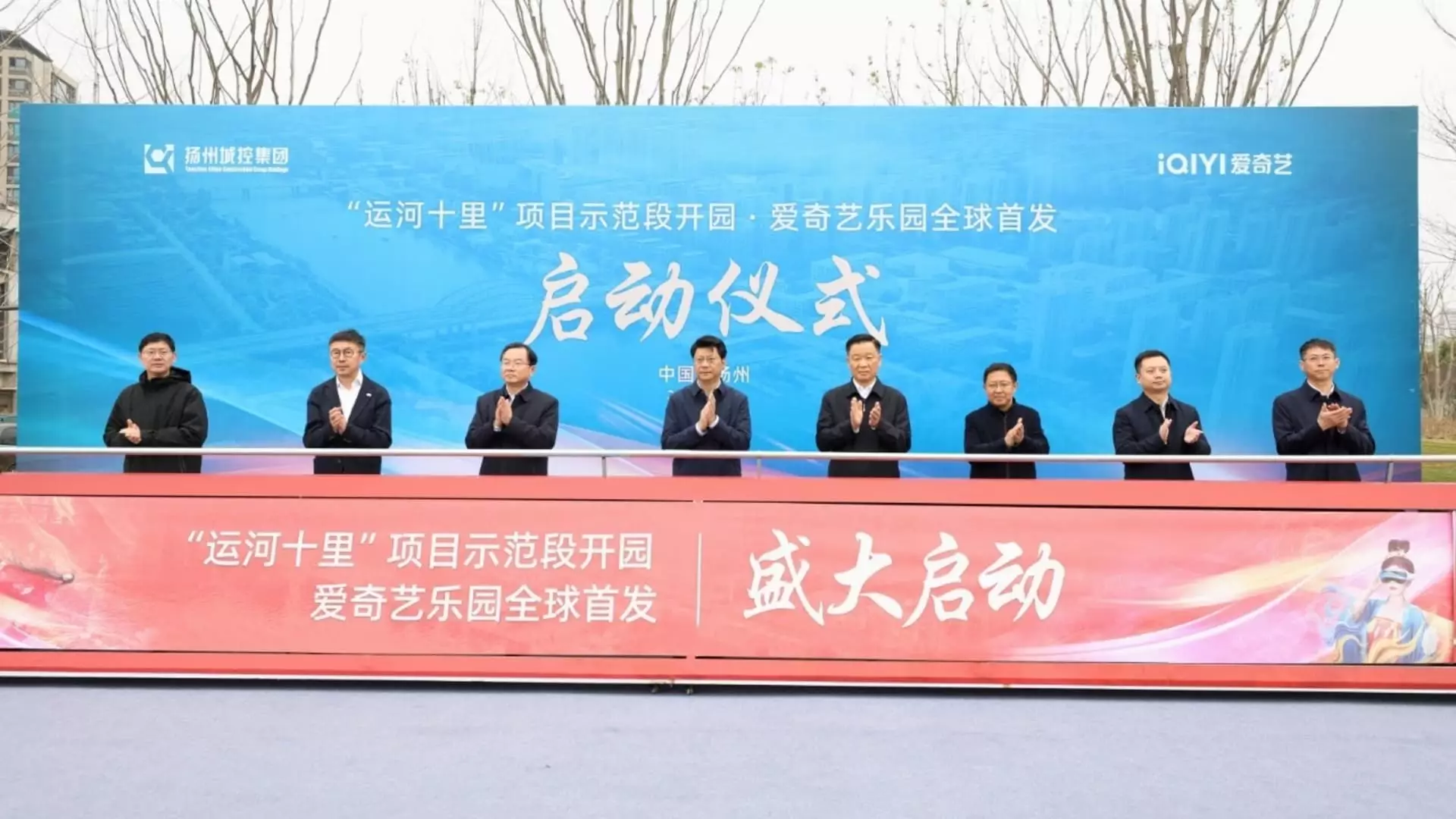In an ambitious move, iQiyi, the Chinese video streaming powerhouse, has announced plans to introduce its first theme park, “iQiyi Land,” in Yangzhou, Jiangsu province. This endeavor, while exciting, is emblematic of a deeper phenomenon: the tension between tradition and modernity in China’s entertainment landscape. It’s not merely about constructing another amusement park; it’s a bold statement reflecting iQiyi’s confidence in a changing consumer landscape even amidst sluggish retail sales. By betting on experiential engagement over conventional shopping, iQiyi is tapping into a trend that could reshape how entertainment is consumed in one of the world’s most dynamic markets.
Yet, this venture raises questions about the sustainability of such escapades. Will consumers continue to flock to entertainment experiences, or are we witnessing yet another corporate gamble prone to backfire? As the nation wrestles with a burgeoning middle class and evolving consumer preferences, iQiyi’s timing could either be visionary or miscalculated.
Leveraging Technology to Create Unique Experiences
In a world increasingly reliant on technology, iQiyi’s latest venture incorporates advanced virtual reality (VR) and artificial intelligence (AI) to deliver a distinct theme park experience. The company is championing cutting-edge attractions that promise to transport visitors beyond the conventional thrill of roller coasters. By utilizing VR headsets combined with dynamic content, they aim to craft immersive narratives from their popular shows—where fans can feel as if they are traversing fantastical landscapes as their favorite characters.
This tech-savvy approach presents a dual-edged sword. Enhancing guest experiences through interactivity could lure tech-savvy millennials and Generation Z who seek personalized avenues beyond traditional forms of entertainment. However, it also invites skepticism from traditionalists inclined to believe that a theme park should be replete with physical rides and attractions. As the park blurs the lines between virtual and reality, it risks alienating purists who cherish tangible experiences over digital simulations.
A Competitive Arena for Chinese Theme Parks
iQiyi’s venture into the theme park landscape aligns with a broader trend as companies like Legoland and Warner Bros. invest heavily in similar projects. With Legoland’s Shanghai opening and Warner Bros. targeting a 2027 timeline for a Harry Potter Studio Tour, the stakes are high. However, competition is not merely about who opens the most thrilling rides but about how well each platform taps into local narratives and preferences.
The International Association of Amusement Parks and Attractions forecasts an eye-popping 480 billion yuan in revenue from Mainland China’s theme parks this year, a staggering leap from prior benchmarks. This astonishing growth showcases a golden opportunity, but it also implies fierce competition. iQiyi must not only differentiate itself with its technology and character-based attractions but also carve out a unique identity that resonates with audiences amid a crowded marketplace.
The Experience Economy: Consumer Preferences in Flux
On the consumer front, the drive towards experiential engagement intersects with China’s overarching economic narrative. With a consumer price index growth sluggish at 0.2% last year, it presents a paradox: while retail may be stagnant, the appetite for memorable experiences continues to thrive. This speaks volumes about evolving priorities among China’s consumer base—many are seeking richer, more fulfilling interactions rather than merely acquiring goods.
iQiyi’s initiative is timely in this context, aligning with governmental desires to fuel economic recovery through the experience economy. It’s not only about fun; it’s about facilitating profound connections between individuals and entertainment. Yet, there remains skepticism whether this is a passing trend or if it genuinely reflects a societal transformation.
Challenges Looming Ahead
Nonetheless, the path to success isn’t paved with gold. iQiyi faces numerous challenges, including logistical hurdles and market saturation. The theme park’s opening may run into delays, as seen in other major projects throughout the country. Moreover, as iQiyi reported an 8% dip in revenue last year, contrasting with the prolonged economic slump, the company must focus not only on executing this grand vision but also on its overarching business strategies to sustain growth.
It’s imperative for iQiyi not to lose sight of the content that fuels its brand. The battle for consumers’ attention remains fierce as competition mounts from other streaming services and immersive entertainment providers. If iQiyi’s theme park fails to encapsulate the magic that draws people to its online platform, the glamorous concept of iQiyi Land could quickly turn into a cautionary tale.
IQiyi’s foray into theme parks marks an important chapter in China’s entertainment evolution, highlighting the clash between innovation and consumer preferences. A calculated risk lies ahead, as stakeholders eagerly anticipate whether the thrill of “iQiyi Land” will translate into lasting success or merely a fleeting moment in China’s expansive entertainment saga.

